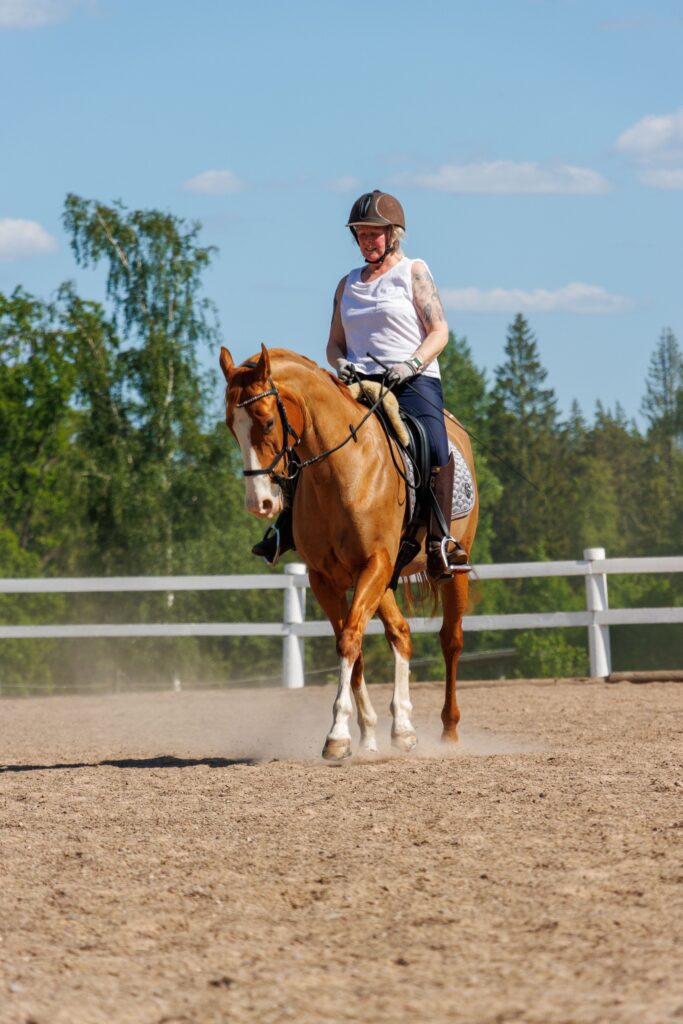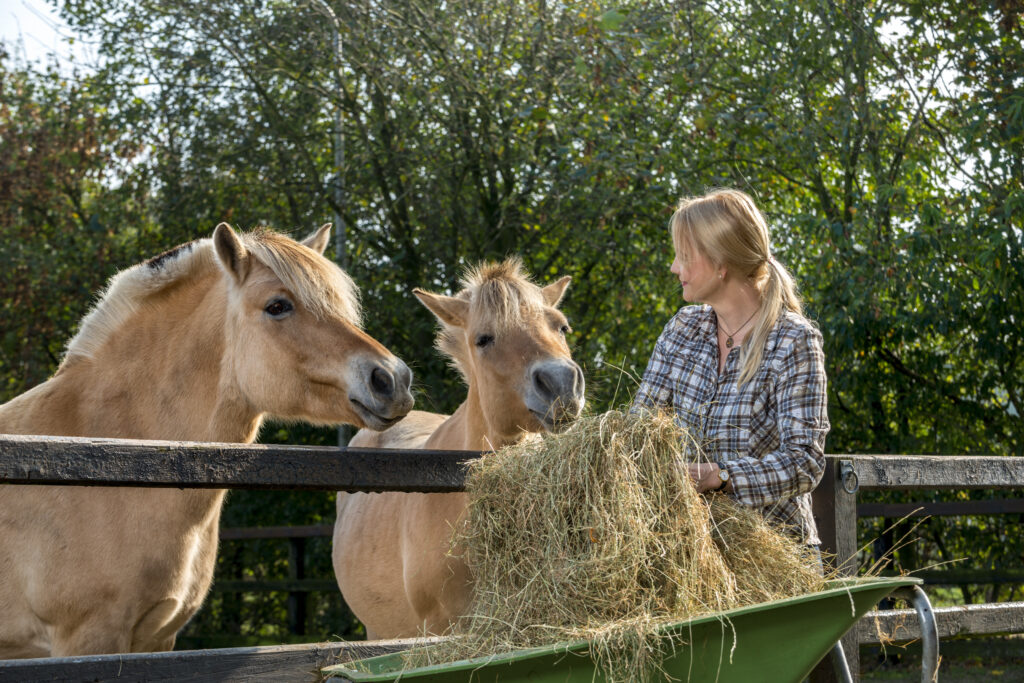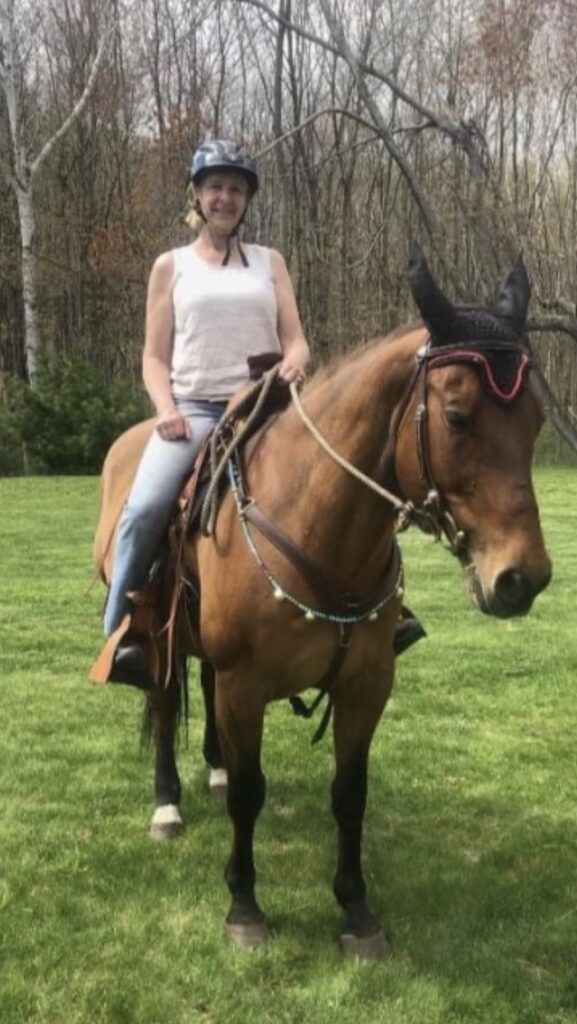Home > Horse World > You’re not too old to ride
You’re not too old to ride
- October 6, 2025
- ⎯ Karen Baril
I know what it’s like to be eligible for a senior discount while still feeling like a horse-crazy kid. The paradox never fails to mystify me. It doesn’t seem so long ago that I learned to ride on a sweet and gentle Thoroughbred gelding named Henry. I was 8 years old, and the year was 1969.
I’ve enjoyed a lifelong passion for horses. I often wonder how I’d feel about aging if I didn’t have a barn to clean, troughs to scrub, and three of my own horses to brush and fuss over. My guess is that I’d be looking around my house saying, “Now what?” Instead, happily, my plans for this afternoon center around looking for a saddle to fit my new Haflinger.

Still, I’ll admit, I occasionally contemplate the million-dollar question: How old is too old to continue with my horse passion? I’ve asked my co-workers and, of course, my horse buddies. And this is where it got pretty interesting. The answer, I discovered, depended more on who I asked and less on any evidence one way or the other.
My co-workers suggested I will have to hang up my hardhat sooner rather than later. One woman had this to say: “Karen, you are getting older. You have to accept that you’re approaching the age when taking care of horses will be too hard.” She said this in a slow, deliberate tone, as if she was giving me a bad prognosis and was hoping to soften the blow. When I gave her a blank look, she added, “You could break!”
Looking to the future
When I asked my horse-loving friend Kim, aged 63, she snorted. “I plan to have horses until the day I keel over!” She would have liked to chat a little longer, but she was heading to Tennessee to pick up a young mule. She plans on making him her new trail partner. She thinks he might be a good candidate for driving as well.
My other horse-loving friends didn’t take long to consider the question, either. I had a hard time pinning them down because they were too busy doing barn chores or taking lessons. Aline, 60-something, just started liberty play with her new mare. Tim, age 70, was practicing mounted archery on his mustang, and Kelli, age 67, was prepping to do a hunter pace on her Haflinger mare. “I mean, I don’t go crazy like I used to,” Kelli says, “but I love to go.”

It seemed to me that my equestrian friends weren’t slowing down at all. If anything, they were gearing up. While it’s true that none of them deny that mucking stalls and even mounting up takes a little more effort now, overall, they feel physically, mentally and emotionally fitter than their friends who don’t have horses.
A healthy lifestyle
While I was researching this article, the following suggestions for healthy aging came up again and again. I know the experts didn’t have horses in mind when they wrote them, but I noticed that my horse passion checks off all the boxes.
Keep learning.
Age-related changes in the brain are not inevitable. Current research shows that many cognitive changes resulting in memory-loss, dementia and depression are related to lifestyle. Learning a new trail pattern, taking lessons in a new discipline, or even mentoring other riders helps to keep my mind sharp.
• Exercise at least 30 minutes a day.
This one isn’t hard to do if you have a horse. There’s always a paddock or a stall to clean, a barn aisle to be swept or a horse to be brushed. Our muscle mass decreases as we age and, with that, we lose strength. But this loss can be slowed considerably, and even reversed, through strength training with free weights or exercise bands. And it is never too late to start. Talk to your doctor and consider enlisting the help of an exercise physiologist or a physical therapist to design a healthy program.
• Do things that make you happy.
Stress is tough to avoid these days, and the stress hormone cortisol can damage the neural pathways in the brain. Spending time with my horse is like meditation for me. I’ve also developed a not-so-secret passion for brightly colored synthetic tack. I’ve got a new purple biothane bridle with green overlay. My Haflinger looks amazing in it and the colors make me smile.
• Believe in yourself.
Too many of us, as we get older, apologize or joke about our “senior moments,” but research shows that just making those comments can reinforce decline. Seniors who expect to lose cognitive function, or who believe they are losing it, perform worse on cognitive tests than their more confident peers. If you think you’re old, you’ll start acting like an old person. For me, there is something about managing a horse that is empowering. I feel mentally strong and capable.
• Act like a kid.
One survey of 2,000 British adults found that acting younger than their age made them happy. Sixty-two percent of respondents said that embracing their inner child also helps to keep them fit and energized. I still ride bareback. I have to use a taller mounting block and I stand my quiet Quarter Horse on the downhill side of a slope, but once I get on, I can’t stop smiling. The feeling lasts for days.
• Be creative.Lasell Jaretzki Bartlett doesn’t ride as much as she’d like to, but she does have lots of experience to share. Lasell did something unique and creative with her time; she wrote a book—Getting Along with Rusty: Horses, Healing, and Therapeutic Riding. It’s a great book that inspired me to jot down some of my experiences as well. Don’t underestimate the life experiences you can share with others.
Accept and adapt
It’s true, there is a big difference in my confidence level now that I’m older. When I was 20-something, I thought nothing of galloping along twisty forest trails. Foolishly, I didn’t even wear a helmet. These days, that’s way too risky for me. Research tells me there’s a physiological reason for my avoidance of risky behaviors.
Our prefrontal cortex (PFC), the part of the brain believed to be the epicenter of cognitive function, may decrease in size by 5 percent per decade after age 40, according to a 2006 study published in the Postgraduate Medical Journal. Considered the part of the brain that makes us uniquely human, the PFC governs motor tasks, abstract thinking, creativity and decision-making.
A 2018 study published in Neuron, from University of Pennsylvania researchers Joseph W. Kable, PhD, and Caryn Lerman, PhD, suggests that connectivity between the amygdala (a small, paired, almond-shaped structure in the brain that is responsible for emotion) and the PFC influences a person’s inclination to engage in risky behaviors. Age-related changes in our brains may make us less inclined to take risks. Or perhaps greater caution comes with experience, both in terms of the “school of hard knocks” and a realization of the potential consequences of accidents. Regardless, my lower tolerance for risk can, if properly channeled, help keep me safe. Here’s how I put the science to work for me:
• I ride a calm horse.
I’m old enough to know there’s no such thing as bombproof, but I also don’t have to ride a highly reactive horse. My Quarter Horse is generally calm and level-headed, but he’s not bombproof. On the days that he seems on high alert, I don’t ride. Instead, I clean my tack or just hang out with him. As my friend Kelli points out, she’s more careful: “I don’t get on other people’s horses anymore. I sold a horse last year that spooked easily and bought myself a mellow Haflinger mare.”

Longtime EQUUS contributor Karen Elizabeth Baril lives on a farm with her husband, two horses and two dogs.
• I use safety gear.
I wear a properly fitted helmet, a safety vest, and comfortable riding boots. Safety stirrups that release in the case of a fall are a great invention and they even come in an artfully tooled Western style.
• I wear comfortable clothing.
Super comfy pants and shirts are a must. Tush cushions are great for long trail rides and swivel stirrups relieve hip and knee pain for achy joints. I invested in a lightweight synthetic saddle that’s easy for me to lift.
• I seek out the right peer pressure.
There are multiple online social media groups for equestrian seniors. There you can ask questions, find tips, or get inspiration. For real life get-togethers, check out groups like the Old People’s Riding Club (OPRC); membership is open to anyone over the age of 21. They offer judged trail rides, scavenger hunts, and even disaster preparedness. Many horse shows offer Silver Stirrup divisions for seniors as well.
• I don’t ride when the moon is full.
I say this with tongue in cheek, but I do actually avoid riding on super brisk, windy days when my horse will be friskier than I like. Those days I may watch educational equestrian videos on You Tube instead.
• I go easy on myself.
When I was younger, I chastised myself if I skipped an opportunity to ride or postponed a session working with my horse. Not anymore. Nowadays I know it’s okay to decide not to ride. When I hang out with my horse with no agenda, he seems to be just as happy.
The affordability question
It’s true, I do worry about my future finances. How will we manage to keep horses on a fixed income? There are all sorts of ways to approach this question:
• Work with a financial advisor when nearing retirement to determine what you can afford.
• Consider half- or partial-leasing your horse to a local rider to defray costs.
• Move your horse to a less fancy barn, perhaps a rough-board or co-op situation.
• Keep up with veterinarian, dentist and farrier appointments. Delaying these will cost you more in the long run.
I encourage those who decide they can’t afford to purchase another horse to maintain their connection to the horse world. Put the word out that you’re looking for a horse to brush or care for, part time. Many seniors, in particular, would love a new barn buddy.
Consider volunteering at a therapeutic riding facility or a horse rescue. Both are opportunities to stay involved. Do you have a skill you can teach? Perhaps if you don’t have the day-to-day financial responsibility of a horse, you can invest in riding lessons or plan a riding vacation.
During the course of writing this article, I’ve had to stop several times—once to help my husband load hay into the barn, once to hold my horses for the farrier, and, yes, once to ride my Quarter Horse bareback. I expect my smile will last for a few days, bare minimum.
To read more about how horses can enhance life, click here.





